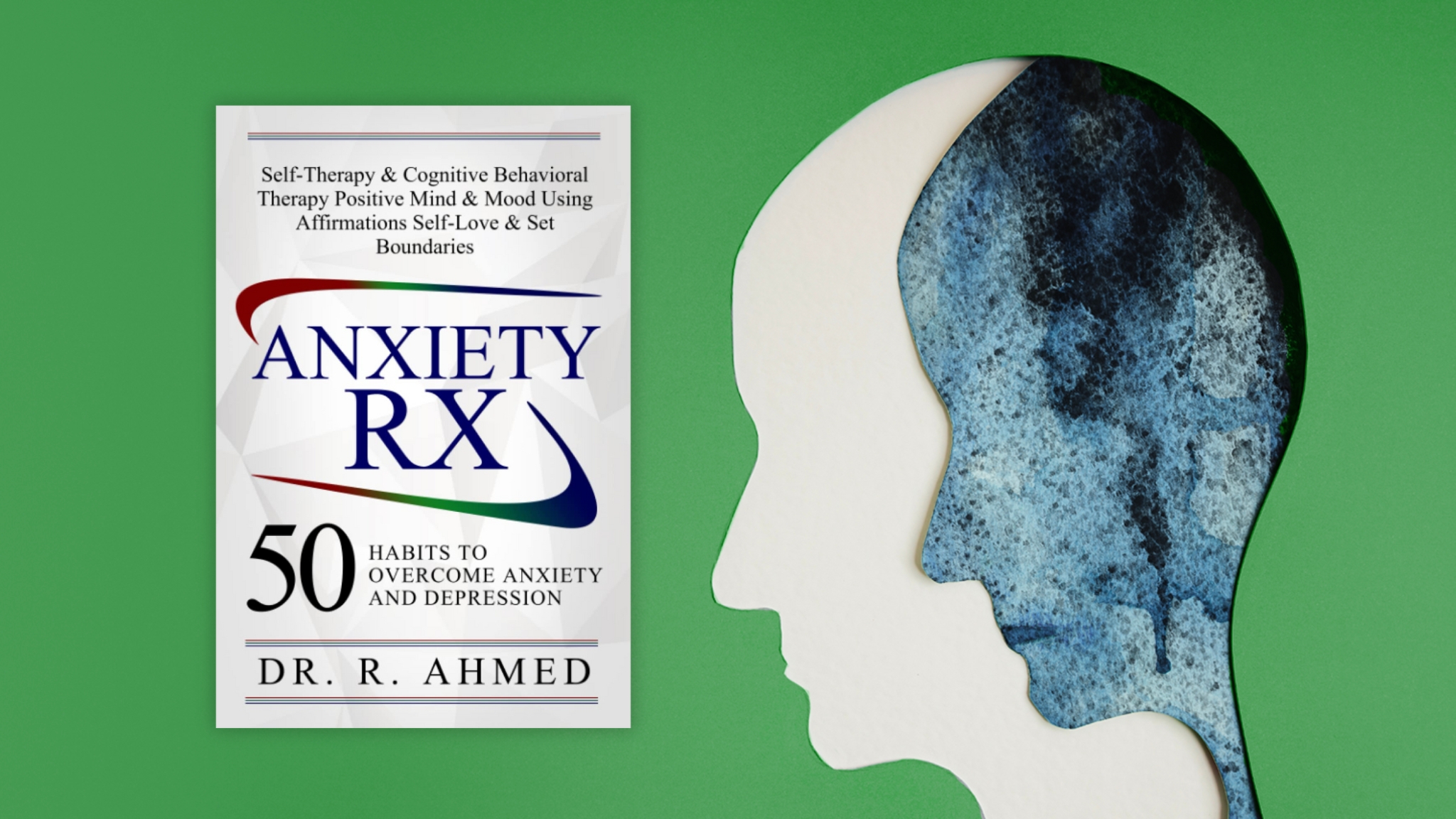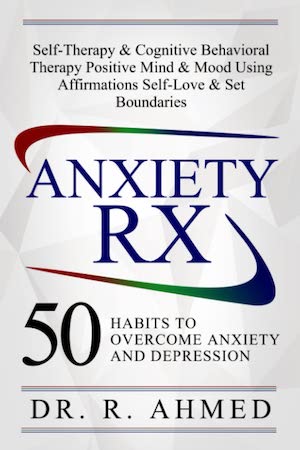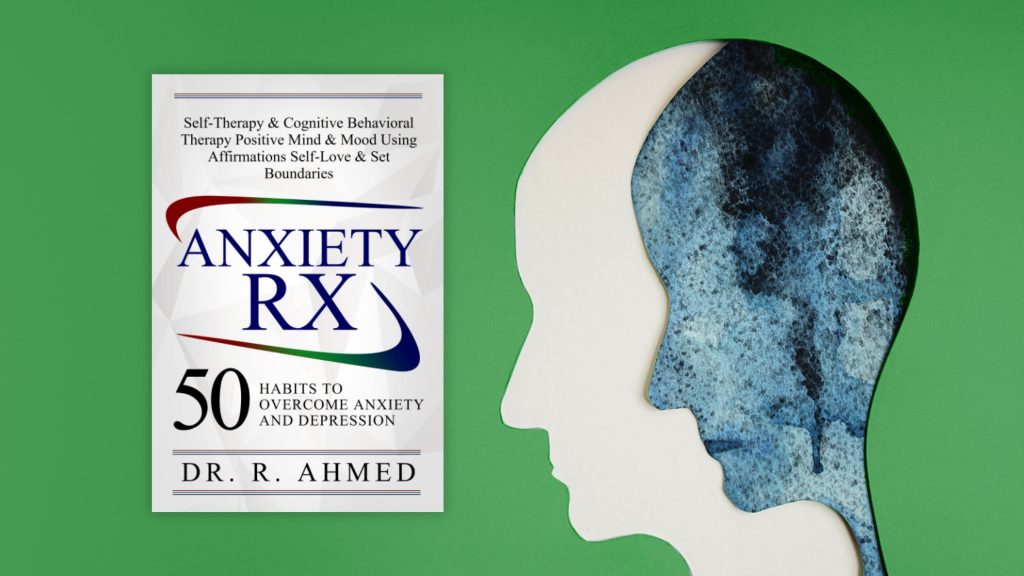
Anxiety Rx: 50 Habits to Overcome & Prevent Anxiety and Depression by Dr. R. Ahmed
“We all have one shot at life, and people should make the most of it by being able to actively control mental health issues like anxiety and depression — and not the other way around.”
Those are the words of Dr. R. Ahmed, who offers clear solutions to people coping with anxiety and depression in his new book, Anxiety Rx: 50 Habits to Overcome & Prevent Anxiety and Depression.
Anxiety and depression, because they are mental illnesses, affect our ability to think clearly. When the symptoms worsen, the first thing we want to do is relieve them, but how? How can we think of a solution when we’re already in a severe state of depression with anxiety added to the mix?
In this recent interview, Dr. Ahmed explains why he wrote this book, how to use it and what some of his theories are to prevent and relieve the symptoms of anxiety and depression.
Q: Why did you write this book?
A: When I was practicing medicine, I noticed that most patients focused on medication rather than coping methods and failed to realize that both go together. This was always in the back of my mind until one day I stumbled across an article by the World Health Organization which stated that the recent COVID-19 pandemic triggered a 25 percent rise in cases of anxiety and depression globally. That’s when I decided to write a book that would provide a handy list of 50 ways to cope with (and perhaps prevent) anxiety and depression.
Q: How should people use this book?
A: This is best used as a reference book. Readers undergoing treatment for anxiety and depression may use the book as a supplement, as a tool for learning and implementing coping methods. Others may use it as a tool to prevent anxiety and depression. I advise that readers first glance through the chapters in the table of contents and mark the coping methods which they like and feel are easy to implement. Thereafter, they may read the rest of the book as they see fit. Whether you feel that you’re a victim of anxiety and depression or not, it’s important to understand the destructive nature of this disease and to plan for it, either as a treatment or prevention.
Q: Tell us about your background and why you chose to focus your work on Anxiety and Depression.
A: I started my career as a Family Physician and gradually transitioned to Healthcare Informatics and Investing. My primary motive for leaving medicine was that I felt healthcare had become monetized and I also found it difficult to provide quality care to patients within the confines of HIPAA regulations, health insurance intricacies, and malpractice laws. This career transition gave me a wider lens to not only study anxiety and depression but to contribute to mental health and self-help communities at large. Mental illnesses have always been on the rise and recently aggravated by the COVID-19 pandemic. We need mental health professionals (and volunteers) to step up and help now more than ever.
Q: What are some simple traps people fall into that lead to Anxiety and Depression?
A: One of the biggest is not being able to identify trigger points. When someone hurts you intentionally, TWICE, that’s enough to place a red flag on the individual. The problem here is that love often blinds us and gives us hope. We fail to realize that our reaction to pain from loved ones is purely insane, for as Albert Einstein once said, “The definition of insanity is doing the same thing over and over again and expecting different results.”
The second trap is that we try to reinvent the wheel repeatedly by ignoring or even forgetting what works. One of my patients had a habit of keeping a notebook in which she logged her past symptoms and medication I had prescribed that had worked. She was so organized that at each of her outpatient visits she would tell me which medications had worked for her. It was this type of active thinking that kept her healthy.
Q: What are some theories presented in your work that help people overcome Anxiety and Depression?
- Exercise: exercise boosts the release of endorphins, serotonins and dopamine which are neurotransmitters that regulate mood and lessen anxiety and depressive symptoms. The stress hormone cortisol, which is frequently high in patients with anxiety and depression may also be reduced by exercise (something simple as 30 minutes of walking). Other benefits of exercise include stress reduction, sleep enhancement and self-confidence.
- Hobbies, mindfulness, painting, drawing, coloring: hobbies allow individuals to become more aware of their thoughts and emotions by concentrating on the here and now and the task at hand, which can help lessen feelings of being overwhelmed and encourage a sense of calmness.
- Toxic people and toxic family: those that are toxic affect others negatively and create dysfunction in their surroundings. They frequently engage in emotional sapping, manipulation and control. It’s crucial to detect the warning signals of toxic conduct in others and learn how to protect yourself since spending time with toxic people may be detrimental to your mental and emotional well-being.
Family members can harm you in several ways, including psychologically, emotionally and even violently.
- Respect yourself, practice self-care: how do you feel when someone mocks you and disrespects you? You should feel the same way when you mock and disrespect yourself. Respecting yourself makes it more likely that you will practice and prioritize self-care by eating healthy, exercising regularly, getting enough sleep, participating in hobbies that keep you fully absorbed, happy and distracted from negative thoughts and negative people, establishing healthy boundaries, and by engaging in in behaviors and relationships that are consistent with your values and objectives.
- Practice gratitude: negative thoughts and emotions of hopelessness, which can be overpowering and challenging to overcome, frequently drive anxiety and depression. By the practice of thankfulness, we may teach our brains to pay attention to the good things in life even when faced with challenging situations. This mental change can help to give perspective and lessen the intensity of unpleasant feelings.
Q: What do you hope readers will take away from reading this book?
A: Those readers who have travelled by airplane may have noticed the flight attendant, while going over the safety protocols before a flight, instruct passengers to place an oxygen mask on themselves first, and then to place one on their child. Likewise, I would like my readers to prioritize their health, to respect themselves and to value their life.

Publish Date: May 22, 2023
Genre: Nonfiction, Self Help
Author: Dr. R. Ahmed
Page Count: 119 pages
ISBN: 9798987857236

